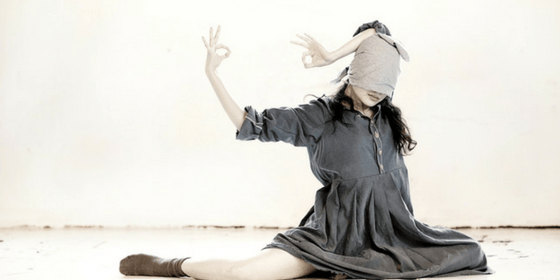From rising star Korean company Yangson Project, Factory Girls is a beautifully crafted physical theatre show set in a factory during the Japanese occupation of Korea in the 1930s embarking on a UK tour this Combining text (in Korean with English surtitles), movement, sound, and ensemble of four, Yangson Project brings a piece of Korean history to a UK audience. Director, Park Ji-hye, tells us more about Factory Girls.
More details can be found here.
Tell us briefly what the show’s about
Set in Japanese occupied Korea in the 1930s, the show follows Oksun, an 18 year old girl from a working class family who has been working in a textile factory for three years. She and the other factory girls work in harsh conditions and are worried that their pay, already very low, could be cut again. Then one day the Japanese factory director calls Oksun into his office and gives her a bonus, asking her to visit Kunju’s home. Oksun and Kunju are old friends and work at the same factory. Upon entering Kunju’s home, Oksun discovers that factory girls are discussing poverty, recession, and labour strikes. Will Oksun tell her Japanese boss?
Do we need to know anything about 1930s Korea to understand it?
I don’t think it’s important to be knowledgeable about the exact context. One of the people from Farnham Maltings who saw the extract of Factory Girls we did at the Seoul Arts Market commented that the he saw parallels between the historical setting of the show and the British industrial revolution, so I think audiences can imagine the situation.
As a company we want to talk about politics and society and we think the best way to do this is through a personal story. We feel this creates a better connection between the audience and the themes. It is the main character’s inner conflict that interests us the most and through this we can see the world around her. So in that sense I think the themes of the show are universal.
What do you want audiences to leave feeling?
We have spoken about this a lot! But we think it’s impossible to make the audience feel something collectively. What we hope to do is provide a window into the feelings of Oksun, and experience her life together. She has many possibilities at the end so we want to allow the audience to drawn their own interpretations.
What are you most looking forward to about touring the UK?
The UK and Korea are very different cultures. So we are interested to see how the show resonates with British audiences and how their reactions might be different to Korean audiences or if there are things we share. And fish and chips!
Do you think British and Korean theatre are similar or different?
We really like the work of DV8 and think their work is quite similar to ours. The main difference we see is that on the whole Korean audiences expect very polished productions which puts pressure on companies. Our experience of some British independent theatre is that they embrace the DIY aesthetic and seem to enjoy the creation process a lot more.













